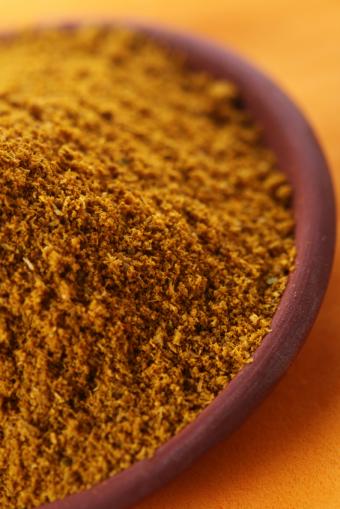
Curry is actually a group of culinary dishes made from a blend of herbs and spices known for their exotic flavors and intense scents. The blend is called curry powder in the Western world. The culinary benefits of curry powder are enjoyed worldwide but its benefits may extend well past the kitchen.
Curry Powder Ingredients
When prepared with organic, low-sodium curry powder, low-fat ingredients and eaten in moderation, it appears curry can be part of a healthy diet for most people and it may even be good for you. But since the amounts of curry powder vary depending on the chef and the recipe, it's difficult to determine whether or not you'll reap the health benefits of curry's ingredients every time you eat it.
The curry powder found in your local grocery store or that's featured in your favorite curry dish is made from a variety of herbs and spices. While different brands of powder may vary slightly, most contain the same basic ingredients. Many of these ingredients are known for having properties that benefit health. Here's a breakdown:
Turmeric
This peppery spice is what gives curry dishes their distinctive yellow color. The spice is believed to have anti-inflammatory and antioxidant properties. According to an article by Dr. Andrew Weil, turmeric contains curcumin, a substance shown to delay liver damage, slow the growth of melanoma, cause cancer cells to be more vulnerable to chemotherapy, and help relieve osteoarthritis.
In addition, studies show curcumin to be a promising substance for preventing or treating Alzheimer's disease. Turmeric is not completely without risk. RxList reports that turmeric can aggravate gall bladder problems so people with gallstones or bile duct issues should avoid the spice. In addition, turmeric may slow blood clotting, cause stomach upset or worsen GERD.
Coriander
According to the The Complete Illustrated Book of Herbs, coriander, also commonly known as cilantro, has antispasmodic properties and also helps stimulate the appetite. It's often used with fennel, cardamom, anise and caraway to ease indigestion symptoms.
Cumin
Cumin is believed to help digestion and is a good source of magnesium. Cumin is also showing to be a promising potential treatment for diabetes. According to a PubMed abstract, animal studies determined that cumin did a better job at reducing oxidative stress and inhibiting the formation of advanced glycated end products (which lead to diabetic micro vascular problems) than the commonly prescribed diabetes drug glibenclamide.
Cardamom
Cardamom is used to aid digestion and help food move through the intestines, states WebMd's website. Cardamom is also a good source of minerals including iron, fiber, magnesium, calcium, potassium and zinc.
Cloves
Cloves are known for having a strong, spicy scent with a touch of sweetness. Cloves contain a high concentration of eugenol, a substance popular among natural healers for its antiseptic and anti-inflammatory abilities. Clove oil is sometimes used to relieve toothache pain or help heal the mouth after surgery, although the FDA has stated there isn't sufficient evidence to warrant its use. Eugenol is also believed to have antifungal properties and is being researched as a possible remedy against yeast infection.
Some people experience skin or mouth irritation when ingesting cloves. Cloves may also affect blood clotting.
Nutmeg
Nutmeg is a great source of copper, manganese, folate and other minerals and vitamins. Surprisingly, it's also high in dietary fiber. But nutmeg has a darker side as well. When blended with other curry spices and used in moderation, it's generally safe; however, consuming more than typical food quantities, nutmeg can be seriously toxic. As a result, never use nutmeg alone or combined with other ingredients in quantities higher than what is normally used to season food.
Fenugreek
WebMD states on its website that fenugreek has been used for centuries to lower blood sugar levels. It has also been shown to relieve acid reflux and, because it's high in fiber, it may help with constipation.
Cinnamon
Studies show cinnamon has anti-inflammatory, antioxidant and antibacterial properties. In addition, it may be "helpful as a supplement to regular diabetes treatment in people with type 2 diabetes," according to a Mayo Clinic article.
Black and Red Peppercorns
Ground peppercorns help give a spicy kick to curry recipes. Peppercorns contain a substance called piperine which, according to nutrition expert Dr. Ray Sahelian, has antioxidant, anti-tumor and anti-inflammatory properties.
Salt
Your body needs salt (sodium) to function, but most Americans consume way too much of it. The Centers for Disease Control states that too much sodium can increase your risk of high blood pressure, heart disease and stroke. Many curry powder blends are low in sodium and you can also purchase sodium free varieties. However, curry dishes prepared in a restaurant may have very high amounts of added salt.
The Verdict
So, is curry good for you? It's a difficult question to answer with certainty. Curry certainly contains many ingredients shown to have powerful health properties. It also contains high levels of vitamins and minerals and carries little risk of side effects for most people. However, it's important to keep in mind that most studies were performed on individual ingredients and not curry powder as a whole. In addition, studies were usually performed over a specific period of time using amounts of spice greater than what is typically found in an average curry recipe.
Since most curry blends are spicy, you may want to avoid them or look for mild versions if you're bothered by spicy foods. Spicy foods may aggravate certain conditions such as acid reflux or irritable bowel syndrome (IBS). If you have an underlying health condition such as acid reflux, IBS, blood sugar issues or gall bladder disease, or if you notice any signs of an allergic reaction, it's a good idea to consult your physician before eating curry.







